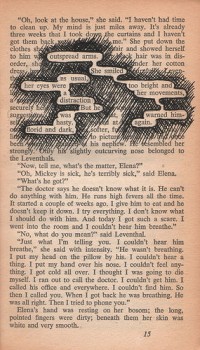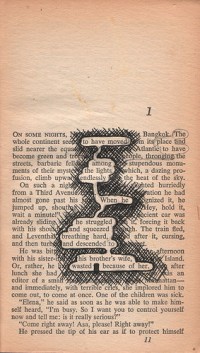Theme Essay by David Meischen
Forché’s “Colonel” vs. Hemingway’s “Lieutenant”
I'm suspicious of the prose poem. I worry that the form is an easy way out, that if we abandon the line and call the result poetry, we're conning ourselves and our readers. Wouldn't it be more honest to call these little paragraphs flash fictions or prose vignettes?
 I’m a fiction writer. I write poetry, too, but I’ve thought like a fiction writer for as long as I can remember, and writing short stories is where most of my energy goes. That said, I owe a debt to poetry. Writing in lines helped me to focus on one phrase, one image, one line at a time.
I’m a fiction writer. I write poetry, too, but I’ve thought like a fiction writer for as long as I can remember, and writing short stories is where most of my energy goes. That said, I owe a debt to poetry. Writing in lines helped me to focus on one phrase, one image, one line at a time.
When I moved back into fiction a few years ago, I took that focus with me, and I believe narrative at its best lives along the shifting border between prose and poetry.
Worrying about these distinctions may seem silly. Yet, we read poetry, fiction, and nonfiction prose in different ways. Regardless of my concerns about prose poems, there are times when a hybrid form really is called for. Such hybrids make us uneasy for good artistic reasons.
With a narrative poem by, say, Robert Frost, the lines direct my reading. I take cues from line breaks, line arrangement, meter, rhyme—all of which are conspicuously missing in a prose poem. If I were to remove the line breaks in Frost's poem to make it look like a paragraph, it would still read like a lined poem, moving forward and down in increments, instead of steadily forward as in narrative.
Prose poems remind me of that old writing workshop adage about making the familiar strange. If we invent worlds that are entirely strange, we make readers so uncomfortable that they don't want to turn the page. But if we present worlds that are entirely familiar, we invite contempt or, even worse, boredom. Prose poems are just unstable enough to offer a vibrant mix of the bizarre and the conventional. At the same time, they infiltrate the innocuous paragraph with heightened language and imagery that make readers notice disturbing oddities under the surface.
Take Carolyn Forché’s “The Colonel.” It first appeared in her 1981 poetry collection The Country Between Us, has been reprinted in a number of poetry anthologies, and is often cited as a classic example of a prose poem.
The syntax of “The Colonel” is familiar; it reads like something out of tough-cop fiction—What you have heard is true. I was in his house. His wife carried a tray of coffee and sugar—just the facts, ma’am, just the basic building blocks of prose.
But six sentences in, the landscape turns strange as we arrive in the realm of poetry: The moon swung bare on its black cord over the house. Syntactically, this sentence follows a pattern established in the first sentence. But I want to write it out in lines like haiku:
The moon swung bare
on its black cord
over the house
 I want to study it—the spare image of the moon, the arresting choice of bare as a modifier, which suggests both full and naked, without defenses. That bare moon swinging on a black cord. Ah, poetry again—the moon as metaphor, the moon as a naked light bulb hanging from the ceiling by a length of insulated wiring.
I want to study it—the spare image of the moon, the arresting choice of bare as a modifier, which suggests both full and naked, without defenses. That bare moon swinging on a black cord. Ah, poetry again—the moon as metaphor, the moon as a naked light bulb hanging from the ceiling by a length of insulated wiring.I’m amazed by how Forché weds image, metaphor, subject matter, tone—how, with bluntly composed sentences and the image of the moon as a naked bulb, she anticipates what is to come. Fifteen sentences later, two-thirds of the way through the poem, the title character empties a grocery bag onto a table in front of dinner guests: He spilled many human ears on the table.
Note the understatement of the sentence itself: subject–verb–object–prepositional phrase. This bald statement forces disturbing connections with Forché’s opening sentence: What you have heard is true. Now, we’re in the realm of the nonfiction vignette. We feel more like witnesses to an actual spilling of severed ears than to a scene invented for fiction.
So, is “The Colonel” a brilliantly written nonfiction prose vignette with poetic elements? Or a poem dressed up for the masked ball as a prose paragraph?
It’s poetry, certainly. When that naked bulb illuminates a room where torturers cut off the ears of their victims, the image becomes a troubling metaphor—a bud enfolding its closed petals, everything opening out as the poem unfolds.
Part of what makes a poem is also the way white space frames the words—the way it separates a poem from what comes before and after, no matter how closely related. Reproduced in the pages of a poetry anthology, “The Colonel” looks like its own little planet in a constellation of planets.
At the same time, it looks like a lost paragraph, and since it follows the conventions of prose—cohesively arranged sentences moving forward against an arbitrary margin—readers approach it as prose, going with the flow of sentences from beginning to end without even noticing line breaks imposed by the margin.
 Every time I read “The Colonel,” it seems like a perfect little prose narrative. But it's also a poem. I recognize the elements of poetry—the compression of language, the brilliance of metaphor—and I hear a voice telling me a story, a tale that sounds more like fiction than poetry.
Every time I read “The Colonel,” it seems like a perfect little prose narrative. But it's also a poem. I recognize the elements of poetry—the compression of language, the brilliance of metaphor—and I hear a voice telling me a story, a tale that sounds more like fiction than poetry.Way back in 1992, the editors of Flash Fiction must have had similar thoughts about “The Colonel.” They included it in their collection, subtitled 72 Very Short Stories, in the volume that gave flash fiction its name. When they set out to create this anthology, as the editors note in their introduction, they imagined reading an entire flash fiction without turning a page. After all, turning pages is something we associate with longer narratives.
In other words, they pictured a flash fiction much as I pictured a poem above—as a little planet set off by white space—or a page turn—from other little planets in a constellation.
I'll always approach prose poems with skepticism. But now, instead of expecting them to fail, I look for successes such as "The Colonel." I’ve come to believe that the prose poem exists because paragraphs of poetry are everywhere in longer works of prose.
Avid readers recognize them. We stop and read them again. We mark brackets around them in the margin. We read them aloud, sometimes purely for the pleasure of hearing the words in solitude, sometimes for the pleasure of sharing the poetry with others. We love the intoxicating mix of poetry and prose, of strangeness dressed in familiar clothing.
Consider, for example, the opening paragraph from Hemingway’s A Farewell to Arms. I’ve taken the liberty of adding a title:
The Lieutenant
In the late summer of that year we lived in a house in a village that looked across the river and the plain to the mountains. In the bed of the river there were pebbles and boulders, dry and white in the sun, and the water was clear and swiftly moving and blue in the channels. Troops went by the house and down the road and the dust they raised powdered the leaves of the trees. The trunks of the trees too were dusty and the leaves fell early that year and we saw the troops marching along the road and the dust rising and leaves, stirred by the breeze, falling and the soldiers marching and afterward the road bare and white except for the leaves.
Notice the rhythmic flow of sentences, the marriage of diction and imagery, the lovely repetitions, the breathtaking image the author closes with. Put this paragraph on a page of its own, frame it with white space—and you have a prose poem.
Publishing Information
 “The Colonel” by Carolyn Forché, originally published in The Country Between Us (HarperCollins, 1981).
“The Colonel” by Carolyn Forché, originally published in The Country Between Us (HarperCollins, 1981).- Flash Fiction: 72 Very Short Stories, edited by James Thomas, Denise Thomas, and Tom Hazuka (Norton, 1992).
- A Farewell to Arms by Ernest Hemingway, originally published in 1929 by Scribner (new edition with Hemingway’s alternate endings: Simon & Schuster, 2012).
Art Information
- “Page 15” and "Page 11" © Eric; Creative Commons license
 David Meischen has short stories in or forthcoming in The Gettysburg Review, Bellingham Review, and other journals. His first published story, “Yellow Jackets,” appeared in Talking Writing, and he won the Writers’ League of Texas Manuscript Contest in Mainstream Fiction in 2011.
David Meischen has short stories in or forthcoming in The Gettysburg Review, Bellingham Review, and other journals. His first published story, “Yellow Jackets,” appeared in Talking Writing, and he won the Writers’ League of Texas Manuscript Contest in Mainstream Fiction in 2011.
Meischen’s poetry has appeared in the Southern Review, Southern Poetry Review, and elsewhere. Coeditor of Wingbeats: Exercises and Practice in Poetry, a 2011 release from Dos Gatos Press, Meischen currently serves as a juror for the Kimmel Harding Nelson Center for the Arts. He was nominated for Best of the Net 2012. Learn more about David at his website, Meischen Ink.
